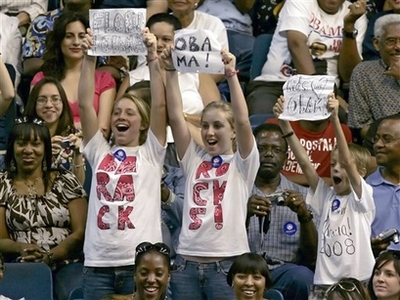Young voters: Obama's race as an asset, non-issue
(Agencies)
Updated: 2008-06-06 20:05
Updated: 2008-06-06 20:05
CHICAGO - For young voters, Rosa Parks' refusal to sit at the back of a bus in Montgomery, Ala., in 1955 is schoolbook history. Even the racially charged 1992 riots in Los Angeles are a distant memory.
 A May 21, 2008 file photo shows a group of young supporters of Democratic presidential hopeful Barack Obama, D-Ill., trying to fire up the crowd before he arrives for a campaign speech in Tampa, Fla. [Agencies] |
The United States is far from a blueprint for racial harmony, but for today's young adults - all born after segregation was outlawed in the mid-1960s - race is not the issue it once was.
They have grown up with Oprah Winfrey and Michael Jordan among their highest-profile and wealthiest role models. And in their everyday lives, they are much more likely than their elders to have friends of another race, studies show.
Is it any wonder, then, that young adults have been the most willing age group to support a black man for president?
Primary exit polls conducted for The Associated Press illustrate the generational shift that has helped Barack Obama secure the Democratic presidential nomination. About 56 percent of Democrats younger than age 30 supported Obama. That number dropped steadily with each age bracket to a low of 30 percent for voters 65 and older.
Many young voters say a diverse background is an asset for a candidate.
"Rather than just being tolerant of race, we embrace and accept our differences," says Alisha Thomas Morgan, a 29-year-old black state lawmaker in Georgia. "We all recognize that racism still exists. But I think younger people are much more willing to get over it."
They also are more accustomed to seeing people of color in positions of power. The country has, for instance, had a black secretary of state for the past seven-plus years.
"I shouldn't say we're taking it for granted. But it's not especially strange to us," says Tobin Van Ostern, a junior at George Washington University who is spending his summer in Chicago as a leader for Students for Barack Obama.
Van Ostern, who is white, says he understands that Obama's victory is historic.
"But it's one that seems appropriate for the direction the country is going," he says. "In numerous ways, it presents a new image of the United States to the world - and not just because of the color of his skin."
Throughout the primary season, Obama supporters endured jabs from pundits and Hillary Rodham Clinton backers who called them "latte drinkers," among other labels. To them, it seemed to suggest elitism and the notion that young adults were taken with the Illinois senator because it was trendy.
Certainly, the chance to vote for a black man is part of the appeal, Morgan says. "It's fine if they vote for him because he's African-American, as long as they don't stop there," she says. "But I would be voting for Obama whether he was white or whatever. The fact that he is African-American is a plus."
The way Patricia Turner sees it, Obama's race is just one factor that makes him more accessible to younger voters. Turner is a professor of African-American studies at the University of California, Davis, a diverse campus where she says no one racial or ethnic group is the majority.
|
||
|
||
|
|
|
|

